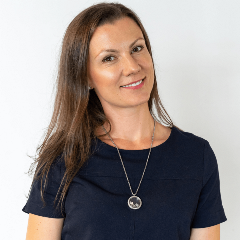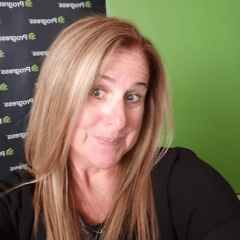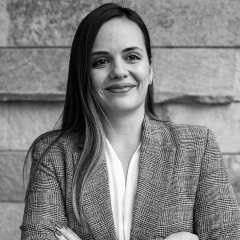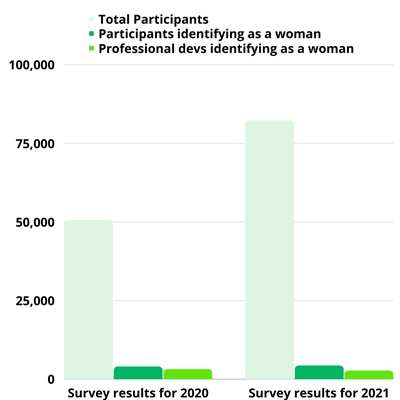This content originally appeared on Telerik Blogs and was authored by Viktoria Kuzmanova
In celebration of Women’s History Month, we asked our fellow Progressers—all distinctive women with positions in the field of software development and tech—about the current developments in the ecosystem and the next steps toward achieving gender equality.
What’s the situation with gender equality in software development on a global scale and what should be done to empower all groups within that society? In celebration of International Women’s Day and Women’s History Month, let’s zoom in a little bit to statistics connected to women in tech.
According to the 2021 edition of Stack Overflow’s Developer Survey, only around 5.31% of the respondents (roughly 4,369 out of 82,286) identified as a woman, and just 4.8% of the professional developers responding were women. More than 92% of the developer participants were men.
For 2020, approximately 8% of the respondents (4,045 of 50,557 participants) stated they identify as a woman, with 7.7% (3,893) of them being professional developers. More than 91% of professional devs taking the survey were men.
In the end, it all comes down to a single question: How do we achieve greater gender equality and inclusion of women in the field?
I decided to go into reporter mode and ask fellow Progressers—all distinctive women with positions in the field of software development and tech—about the current developments in the ecosystem and the next steps toward achieving greater maturity. Join me for this chat!
Maria Veledinova
 Maria Veledinova is our Product Manager for the Telerik UI .NET Web components—Blazor, ASP.NET Core, MVC and AJAX. Experienced in product development, she strives to contribute to the creation of innovative software products that have a real impact on the world of tech. A loving mother and a woman in tech, Maria is always on the lookout for the greater picture when it comes to gender equality in tech, exploring how factors such as education and a culture of empowerment can impact the structure of the dev community, both regionally and on a global scale.
Maria Veledinova is our Product Manager for the Telerik UI .NET Web components—Blazor, ASP.NET Core, MVC and AJAX. Experienced in product development, she strives to contribute to the creation of innovative software products that have a real impact on the world of tech. A loving mother and a woman in tech, Maria is always on the lookout for the greater picture when it comes to gender equality in tech, exploring how factors such as education and a culture of empowerment can impact the structure of the dev community, both regionally and on a global scale.
From your perspective, what is the role of women in tech and how is it going to evolve as time passes?
Women are so colorful and diverse—we are caring, thoughtful, gentle, we bring beauty and balance to the world, and at the same time, we are determined, demanding and, in some cases, perfectionists. Now imagine that applied to the world of technology—exciting and diverse ideas, bold strategies, solid execution plans, innovative products, customer feedback that is heard, teams that are nurtured and taken care of, processes that are constantly improved.
The role of women is to contribute and further develop all areas of our technology future in their own unique way. And, of course, to set an example for the younger generations, showing them how exciting the tech world is and how valuable their contributions can be.
How do you believe your local ecosystem has been developing in terms of progressing toward gender equality? What are the steps that will bring it to greater maturity?
Luckily, in Bulgaria and in Europe, the ecosystem provides great conditions for women to flourish in the tech world, and I am happy to see our local regions being among the champions with a high percentage of women in technology and science. You can see female founders of startups, strong women professionals as software engineers, QAs, designers, product managers, leaders—really any role or position. I think within the local tech ecosystem, gender bias is minimized.
However, outside of the technology community, there are still a lot of barriers and superstitions related to gender equality that need to be cleared up. How can we do that?
- We need to have conversations starting at home with our kids and our parents.
- The educational system needs to encourage the interest of girls in tech—from early ages in kindergarten to university (certainly tech companies can help a lot here).
- As females working in tech, we can support different organizations and the educational system with initiatives that spark girls’ interest in technology, sharing our stories as women in tech and setting examples.
- Those stories of success need to be heard outside of the tech bubble and used to motivate girls to step into any area they aspire to.
What do you believe is the major challenge women in tech will have to tackle in the next couple of years?
The search for balance between our personal and professional lives, and not having to choose one over the other. That challenge is constant.
How do you strive to make space for other women within the tech ecosystem?
My interest in software was sparked by an amazing female leader in my first job while studying at the Technical University. Until then, I knew tech was cool and that it’s the future but didn’t know exactly my place in it. Working side by side with a great role model certainly taught me a lot, gave me confidence and influenced me to continue my career in tech.
Since then, through my various roles in IT to my current role in Progress, I’ve always been inspired by empowered female leads. With time, my role has gradually shifted from a mentee to a mentor for the younger generation. I love being an advocate for the product manager role in tech companies and giving back by working with interns and being able to teach them the tricks of the PM job, get them excited and set them up for success in their careers.
How do you strive to break your own biases connected to gender equality?
As long as there is passion, devotion and sparkle in the person’s eyes, then this is the right job for her/him. Gender is not a factor—desire and attitude are.
What advice would you give to women who are just starting off their career in tech?
Be yourself, be brave and bring your own unique ideas. Don’t try to change who you are to fit in—you can bring value to the world of technology because of who you are, not in spite of it. If you have a passion for solving problems and you love technology, go for it.
Kathryn Grayson Nanz
 Kathryn Grayson Nanz is a Developer Advocate for KendoReact at Progress Software. A Front End Engineer & UI Designer, Kathryn is passionate about writing, blogging, streaming and tweeting about React, design, UI and more. You can find her at @kathryngrayson on Twitter.
Kathryn Grayson Nanz is a Developer Advocate for KendoReact at Progress Software. A Front End Engineer & UI Designer, Kathryn is passionate about writing, blogging, streaming and tweeting about React, design, UI and more. You can find her at @kathryngrayson on Twitter.
From your perspective, what is the role of women in tech and how is it going to evolve as time passes?
The role of women in tech is the same as the role of anyone else in tech—to build things. But when we, as women, bring our unique experiences, perspectives and varied backgrounds to work with us, our teams can create applications and systems that ultimately serve our users better. Apps aren’t only being used by men, so why should they only be built by men? The more diverse our industry can become—in all aspects, not just gender—the more we’ll be able to create solutions that serve all our users.
How do you believe your local ecosystem has been developing in terms of progressing toward gender equality? What are the steps that will bring it to greater maturity?
The State of JS survey results came out recently, and it sparked a huge discussion about the representation of women in our community. Of State of JS survey respondents, only 4% identified as women. And in the list of user-submitted prominent people in the JS community, only 2 out of 25 were women. Of course, this survey isn’t a perfect representation of the entire community (there are definitely more than two women out there creating amazing JS resources), but I do think it points to some frustrating and disappointing truths about gender equality and representation in the JS ecosystem.
I do think the fact that there was much discourse around the topic this year is kind of encouraging. It shows that we are taking steps toward maturity, but I think we’re still in the early stages. Right now, a lot of our time is still being spent on awareness and not necessarily on action. I hope we start to see more action-oriented shifts in the near future.
What do you believe is the major challenge women in tech will have to tackle in the next couple of years?
I think one of the challenges that the pandemic has brought to light most recently is the myth of the woman who “has it all.” To be fair, this isn’t exclusive to tech, but I do see it a lot in this industry.
Women, myself included, were told that if we just tried hard enough, we could do it all: have a successful and high-achieving career, be a perfect mom, a perfect wife, a skilled homemaker, active in our chosen communities, fulfilled with our hobbies, etc. This isn’t particularly realistic, and yet each and every working woman is measured against it in a way that men are not.
The pandemic, however, was especially hard on women’s lives and careers. In tech, there’s an (incorrect) assumption that a “real,” “committed” or “passionate” developer will always be grinding—taking online classes, working on side projects, blogging, tweeting, attending and speaking at conferences, and more. Those things were a lot to demand of anyone before—but now, for many women working with reduced resources and limited support because of the pandemic, they can be almost impossible.
Where do we go from here? I’m not sure, but I hope it’s a more realistic acknowledgment of the work and responsibilities that every person has outside their chosen career—especially the unpaid work that disproportionately becomes the responsibility of women—and an awareness that those things don’t magically stop between the hours of 9 and 5.
How do you strive to make space for other women within the tech ecosystem?
One of the things that has been a goal of mine since starting in DevRel has been to always make sure I’m lifting the voices of other women in the tech community—especially women of color and queer women. I try to be conscious of who created the content I’m sharing or retweeting, who we’re inviting as streaming guests and who we’re asking to speak at events. Women are a crucial part of the tech community, but often don’t get the representation they deserve—especially women who aren’t cis, straight or white. If our “feminism” is leaving any women behind, then it’s not really feminism.
How do you strive to break your own biases connected to gender equality?
Kind of in line with the last question, I’ve been working on ensuring that my approach to gender equality is intersectional. I want to listen to what other women in the space are saying and make sure that I’m always being as thoughtful as possible. When I mess up (and I’m sure I will sometimes), I welcome a correction and will follow that with learning, apologizing, fixing my mistake and working to get it right from then on.
What advice would you give to women who are just starting off their career in tech?
Almost every woman in tech has at least one horror story that she can tell you. As you break into the industry, getting jobs and connecting with other women, you’ll be exposed to more and more of these—both the stories from other women and the situations themselves—and it can be really disheartening.
However, it’s not that way everywhere. There are good jobs and good people in tech, and you should never settle for a situation where you’re not valued. At some point, you will probably find yourself in circumstances where you’re not being treated well, but you don’t have to accept that as “just part of the deal” for being successful in this industry—it’s not. Don’t ever sacrifice your mental health, your happiness or your safety for a job.
Sara Faatz
 Sara Faatz leads the Telerik and Kendo UI developer relations team at Progress. She has spent the majority of her career in the developer space, building community, producing events, creating marketing programs and more. According to Sara, who has vast experience within the tech ecosystem, the question of gender equality has evolved and there have been a lot of positive changes, yet there is more to be seen and done. That’s why she is already ready with a plan and maps some steps right here.
Sara Faatz leads the Telerik and Kendo UI developer relations team at Progress. She has spent the majority of her career in the developer space, building community, producing events, creating marketing programs and more. According to Sara, who has vast experience within the tech ecosystem, the question of gender equality has evolved and there have been a lot of positive changes, yet there is more to be seen and done. That’s why she is already ready with a plan and maps some steps right here.
Sara, what is your experience with programming and tech?
Looking back at my life and career, it’s easy to see how I got here, but to tell you I took a direct and deliberate path would be a lie. As a kid, I always had a strong sense of team and community, I loved to read and I liked to try new things.
I had my first exposure to development when I was in elementary school and learned to program in Logo—my brothers and I loved to play on our Commodore VIC-20. But I didn’t really fall in love with technology until after college, during the internet boom. It was at that point that I felt like I had found my place in the world. Being able to combine a passion for technology and my love for people and community led me to a role in developer relations.
From your perspective, what is the role of women in tech and how is it going to evolve as time passes?
I hope one day we won’t even need to have the conversation about women in tech. In an ideal world, we would all simply be “technologists.” All people bring different perspectives and different approaches to work and life. The more open, welcoming and inclusive we are to all, the better our space will become.
How do you believe your local ecosystem has been developing in terms of progressing toward gender equality? What are the steps that will bring it to greater maturity?
Over the course of my career, we have made great progress toward gender equality. It is an area we have identified that we all need to be better in. I think the most valuable thing we can do to continue to evolve is to ensure that we aren’t assuming the intent of others’ words and actions. We need to be able to have open conversations with colleagues, especially when something that is said or done makes us feel excluded or marginalized.
How do you strive to make space for other women within the tech ecosystem?
I would encourage all women (and anyone, really) to celebrate their successes and the successes of others. Don’t brush them off just because they seem small. Our lives are made up of many small moments with a few big ones peppered in. Make sure you take time to recognize, acknowledge and celebrate successes of all shapes and sizes. You will be surprised at how infectious that can be.
What advice would you give to women who are just starting off their career in tech?
First, find an area in tech that gets you excited, that brings you joy. You might have to try a few different things—that’s OK. This space is big enough for everyone. And don’t be afraid to be wrong. As you are finding your passion, find your people. Lean in and build trust. Find people you can talk to openly and ask questions. Build your network—of men and women, as both can serve as strong allies. Find a mentor within that group.
In that same vein, be kind to one another. Be an ally yourself within the space. Find ways to include as many people as you can. If we love what we do and create an inclusive and welcoming environment, others will want to join.
Asya Ivanova
 Asya Ivanova is the Product Marketing Manager for Telerik Test Studio. A passionate technology enthusiast, she has product experience with BIM, Master Data Management and pro audio. Together with the Test Studio team, she keeps an eye on ways to make test automation easier for QA engineers. Asya is a hi-fi geek, spending her time with some good old and new album records. Connect with her on LinkedIn.
Asya Ivanova is the Product Marketing Manager for Telerik Test Studio. A passionate technology enthusiast, she has product experience with BIM, Master Data Management and pro audio. Together with the Test Studio team, she keeps an eye on ways to make test automation easier for QA engineers. Asya is a hi-fi geek, spending her time with some good old and new album records. Connect with her on LinkedIn.
From your perspective, what is the role of women in tech and how is it going to evolve as time passes?
The role of women in tech is as important as within any other industry and, if it weren’t for historic reasons that we are asking this question, we shouldn’t be implying any differentiation at all here. Yet, I am lucky enough to have only seen very positive attitude toward the fact that I am a female, even in male-dominated industries such as construction. I have always felt valued for the professionalism and diverse standpoints that I bring, be it due to being a female, the geographic region I come from or my educational background. And that is how things should be, in every industry.
But I am positive that the professional space, including tech, will be maturing even more in the way women are seen. We live in a digital age with access to so much information and success stories about women in tech, which I am sure will guide us through the decades to come and provide the examples we need to make tech a better industry—one that values diversity and sees you for who you are.
How do you believe your local ecosystem has been developing in terms of progressing toward gender equality? What are the steps that will bring it to greater maturity?
In my local ecosystem, I can say that there have been some great advancements in terms of gender equality. In fact, what I see is that the current challenges are not so much around establishing gender equality in the workspace but are rather associated with providing access for women to the tech professions that were historically dominated by men.
It is less about the willingness of companies to operate according to the gender equality principles and hire women, but more about fostering appeal toward tech, making tech professions interesting and desirable for young girls as well as ensuring women have access to education and are encouraged to embark on a journey in tech.
What is the major challenge women in tech will have to tackle in the next couple of years?
To stop thinking in terms of, “I am a female in tech and this comes with its fair share of challenges,” but instead have the mindset of, “I am a professional and capable to go to work, develop my career, drive some great business ideas and solve the challenges I am faced with every day based on my knowledge, experience and professionalism.”
The assumption that women in tech have challenges to tackle because of being female alone leaves space to question one’s abilities. This change in mindset, which by the way should apply not only to women but to the entire industry, is the key to making this industry a place that values individuals for who they are.
How do you strive to make space for other women within the tech ecosystem?
I encourage my friends and my friends’ female children to consider education and a career within tech as I believe in this industry’s capabilities to make the world a better place. A lot of the developments we will see in the future will be the output of tech. These great start-ups that are emerging every day with better and more promising ideas of how to contribute to the society’s welfare, especially in these trying times we live in, is the best example of motivation and appeal that I can share with the female generation to come.
How do you strive to break your own biases connected to gender equality?
I was thinking about that now and I can’t really say that I am dealing with any biases that distort my experience in tech. However, I can imagine and sympathize with the women who have succumbed to gender equality biases due to the experiences they’ve had. What I can say is that you choose who you are and how deep biases come through to you. I’ve always looked back at situations that have been tough and how I’ve handled them, and I have appreciated the way I’ve done it. Sometimes that has led to success but sometimes to failure, which I’ve always treated as two sides of the same coin and you learn a great deal from both. The same goes for biases—these are just perceptions and do not define your personality as it is your choice how you define yourself.
What advice would you give to women who are just starting off their career in tech?
The future looks bright as you’ve joined an industry that will spark a lot of inspiration for you—be it through the successful women in tech that we hear about every day and want to be like them, or through the causes technology supports through its tools, projects and process output. Enjoy every moment of your learning path as, within tech, just because things are so dynamic, there isn’t another option than to develop your skills and evolve as the industry evolves.
Ivana Dimitrova
 Ivana Dimitrova is a Senior Social Media Specialist, part of the DevRel team here at Progress. Together with her teammates, she works to oversee the social-owned efforts and develop a strong brand for developer-oriented products. Simply put, the TL;DR is: she helps make sure the work the various teams do and the content they create reaches people in an engaging and consistent manner. You can find her doing her social media magic on her personal Twitter account.
Ivana Dimitrova is a Senior Social Media Specialist, part of the DevRel team here at Progress. Together with her teammates, she works to oversee the social-owned efforts and develop a strong brand for developer-oriented products. Simply put, the TL;DR is: she helps make sure the work the various teams do and the content they create reaches people in an engaging and consistent manner. You can find her doing her social media magic on her personal Twitter account.
From your perspective, what is the role of women in tech and how is it going to evolve as time passes?
Regardless of gender, identity, socioeconomic background or discipline—people in tech seem to be, for the most part, creative problem solvers. But because of gender, identity or socioeconomic background, some groups have more than one role within the industry. For women specifically, one of the big things a lot of us try to do in our everyday work life is make space. Make space for ourselves in the decision-making process and make space for others who might not have been historically included in it, too.
For me, the biggest thing is being mindful and keeping an open heart—trying to always ask myself, “Who else needs to be in this conversation?”
Social media management for brands is a relatively new discipline compared to others within the classic structure of an organization. For a lot of us practicing it, this means we have had to elbow ourselves into some conversations and processes. So, it is not hard to imagine that not only people in certain jobs need to make space for themselves, but also people from historically overlooked backgrounds (gender, background, identity, etc.). And I just try to keep that in mind at all times.
How do you strive to break your own biases connected to gender equality?
Community. I do my best to talk to people when I can, keep an open heart and hear the pains of all involved in the effort to a more egalitarian reality. It is not perfect or foolproof—I still come out of conversations frustrated sometimes—but it has worked for me so far.
What advice would you give to women who are just starting off their career in tech?
No matter the discipline, working in tech can be rewarding and enriching—from the broader knowledge of how our blended digital/IRL world is built, to the contact with people from all over the world. Just lean into the community.
What major stigmas/biases connected to gender equality have you seen so far in your career and how did you handle situations connected to that?
One of the big things I’ve encountered is the assumption that just because there is more of a certain group in a given role, it is better suited for that gender. The misconception that more people of a certain group are doing a given job because they are better at it inherently is ridiculous to me.
Skill is not determined by gender or identity, but direction is often determined by socio-economic background and (lack of) educational and other resources. So, whenever I am faced with a blanket statement, I try to speak up and remind people that skill and gender or identity are not inherently connected and should not be viewed in relation to one another.
Thankfully, I encounter fewer and fewer of those biases as time passes, but I also realize the privilege of being part of a company and a team that is consciously working toward eliminating our own biases.
Pamela Petkova
 Pamela Petkova is a Marketing Manager at Progress. Occupied with structuring and executing the marketing programs for the DevTools team, she is always up to date with the latest trends in marketing, which she approaches with consideration for even the smallest detail. An analytical thinker and a tech enthusiast, Pam is always ready to spin off your original idea into at least a dozen others! You can connect with her on LinkedIn.
Pamela Petkova is a Marketing Manager at Progress. Occupied with structuring and executing the marketing programs for the DevTools team, she is always up to date with the latest trends in marketing, which she approaches with consideration for even the smallest detail. An analytical thinker and a tech enthusiast, Pam is always ready to spin off your original idea into at least a dozen others! You can connect with her on LinkedIn.
From your perspective, what is the role of women in tech and how is it going to evolve as time passes?
The tech industry is one of the ways humanity walks toward its future. Walking on that path together with men will bring us closer to horizons we ought to believe possible. I strongly believe we will be seeing more and more women involved in the tech space on all levels and across different disciplines.
What do you believe is the major challenge women in tech will have to tackle in the next couple of years?
The only challenge I could anticipate is women’s own perception of their role and how they would fit in it. Having more female role models and examples in the tech space would definitely help many young girls who are just starting their career better envision and understand how they can be involved and contribute.
How do you strive to make space for other women within the tech ecosystem?
I believe in a fair chance for all of us at a human level. I have been given many professional chances, both by women and men, and today I am at a place, where I wouldn’t have imagined to be five years ago. Whenever there is an open opportunity, I would recommend or consider people who are a good fit for it based on their professional experience and aspirations, personal drive and fit, not based on their gender, age or origin.
How do you strive to break your own biases connected to gender equality?
I strongly stand by the feeling and knowing that we are all equal, but while we are raised from small children our surroundings shape us, and sometimes we are subconsciously adopting programs and beliefs that are most likely not even ours. If I ever encounter a behavior, thought or reaction in myself that is not something I relate to—I question it. I try to identify what are my limiting beliefs in that situation and try to understand how I came to have these beliefs. Is that something that resonates with my personal values, at the core of which sits my own personal belief that we all deserve a fair chance and should be treated as an equal human being? If not, I change it.
What advice would you give to women who are just starting off their career in tech?
This is advice I would give to anyone—the only person who really needs to believe in you is yourself. Know your “why” and, if you want a career in tech, just apply for the job that would make you wake up in the morning feeling energetic and inspired. That is what I did!
This content originally appeared on Telerik Blogs and was authored by Viktoria Kuzmanova
Viktoria Kuzmanova | Sciencx (2022-03-17T12:24:02+00:00) Celebrating Women in Tech With Fellow Progressers. Retrieved from https://www.scien.cx/2022/03/17/celebrating-women-in-tech-with-fellow-progressers/
Please log in to upload a file.
There are no updates yet.
Click the Upload button above to add an update.

